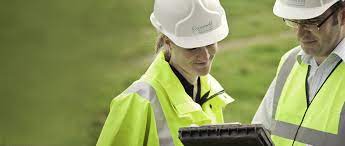
The Role of an Environmental Consultant in Protecting Our Planet
Environmental consultants play a crucial role in safeguarding our planet’s natural resources and ecosystems. These professionals are tasked with assessing, evaluating, and advising on a wide range of environmental issues to ensure sustainable development and conservation practices.
Responsibilities of an Environmental Consultant
One of the primary responsibilities of an environmental consultant is to conduct thorough assessments of sites to identify potential environmental risks and impacts. This includes evaluating air quality, water resources, soil contamination, and biodiversity.
Environmental consultants also work closely with businesses, government agencies, and non-profit organisations to develop strategies for minimising environmental impact and complying with regulations. They provide expert guidance on pollution prevention, waste management, energy efficiency, and sustainable practices.
Importance of Environmental Consultants
In a world facing increasing environmental challenges such as climate change, deforestation, and pollution, the role of environmental consultants is more critical than ever. By helping organisations adopt environmentally responsible practices and policies, these professionals contribute to the preservation of our planet for future generations.
Environmental consultants act as advocates for sustainability and conservation efforts by raising awareness about environmental issues and promoting best practices in resource management. Their expertise is instrumental in shaping policies that protect ecosystems, wildlife habitats, and human health.
Career Opportunities in Environmental Consulting
Individuals interested in pursuing a career as an environmental consultant can explore diverse opportunities across various industries such as energy, construction, agriculture, and government. With a growing emphasis on sustainability and green initiatives, the demand for skilled environmental consultants continues to rise.
Whether conducting field surveys, analysing data, or developing risk mitigation plans, environmental consultants play a vital role in shaping a more sustainable future for our planet. Their dedication to protecting the environment serves as a beacon of hope for fostering harmony between human activities and nature.
Six Essential Tips for Aspiring Environmental Consultants in the UK: Navigating Regulations, Skills, and Specialisations
- Stay updated on environmental regulations and policies in the UK.
- Develop strong analytical and problem-solving skills to assess environmental issues.
- Build good communication skills to effectively convey complex information to clients and stakeholders.
- Collaborate with other professionals like engineers and scientists for comprehensive environmental assessments.
- Consider specialising in a specific area such as water quality, air pollution, or waste management.
- Continuously seek professional development opportunities to enhance knowledge and expertise in the field.
Stay updated on environmental regulations and policies in the UK.
It is essential for environmental consultants to stay updated on environmental regulations and policies in the UK. By keeping abreast of the latest developments in legislation and government initiatives, consultants can ensure that their recommendations and strategies align with current standards and requirements. This proactive approach not only demonstrates a commitment to compliance but also enables consultants to provide valuable guidance to clients on navigating the complex landscape of environmental governance. Stay informed, stay compliant, and make a positive impact on protecting our environment for future generations.
Develop strong analytical and problem-solving skills to assess environmental issues.
To excel as an environmental consultant, it is essential to cultivate robust analytical and problem-solving skills to effectively assess complex environmental issues. By honing these abilities, consultants can methodically analyse data, identify potential risks, and devise innovative solutions to mitigate environmental impact. Strong analytical skills enable consultants to interpret scientific information accurately, while sharp problem-solving capabilities empower them to address challenges proactively and implement sustainable practices for the benefit of our planet.
Build good communication skills to effectively convey complex information to clients and stakeholders.
Effective communication skills are essential for environmental consultants to convey complex information to clients and stakeholders. By building strong communication abilities, these professionals can articulate intricate environmental issues in a clear and concise manner, ensuring that all parties involved understand the implications and potential solutions. Whether discussing pollution control measures, biodiversity conservation strategies, or sustainability initiatives, the ability to communicate effectively fosters collaboration and facilitates informed decision-making towards protecting our planet’s precious resources.
Collaborate with other professionals like engineers and scientists for comprehensive environmental assessments.
Collaboration with other professionals, such as engineers and scientists, is essential for conducting comprehensive environmental assessments as an environmental consultant. By working together with experts from different fields, environmental consultants can leverage their collective knowledge and skills to gain a deeper understanding of complex environmental issues. Engineers bring technical expertise in designing sustainable solutions, while scientists provide valuable insights through data analysis and research. This collaborative approach ensures that environmental assessments are thorough, accurate, and effective in addressing environmental challenges and promoting sustainable practices for the benefit of our planet.
Consider specialising in a specific area such as water quality, air pollution, or waste management.
When pursuing a career as an environmental consultant, it is advisable to consider specialising in a specific area of expertise, such as water quality, air pollution, or waste management. By focusing on a particular environmental issue, consultants can deepen their knowledge and skills in that area, allowing them to provide more targeted and effective solutions to clients and stakeholders. Specialisation not only enhances professional credibility but also enables consultants to make a greater impact in addressing critical environmental challenges facing our planet today.
Continuously seek professional development opportunities to enhance knowledge and expertise in the field.
It is essential for environmental consultants to continuously seek professional development opportunities to enhance their knowledge and expertise in the field. By staying updated on the latest trends, technologies, and regulations, consultants can better address environmental challenges and provide effective solutions. Professional development not only expands their skill set but also ensures that they remain at the forefront of sustainable practices, enabling them to make a meaningful impact in protecting our planet for future generations.
